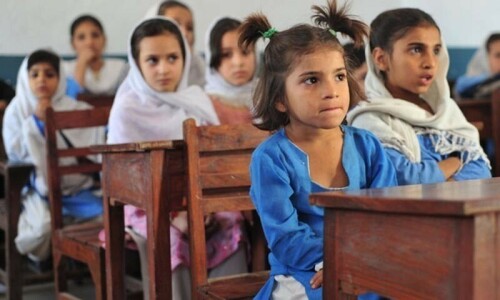RAWALPINDI: Special Assistant to Prime Minister on Social Protection and Poverty Alleviation Dr Sania Nishtar visited Child Protection Home in Rawalpindi and the Edhi Home in Islamabad.
Dr Nishtar interacted with the children and women and social welfare workers in Edhi Home and was briefed about the activities of both the centres.
The child protection centre takes custody of children who are lost or found on streets unaccompanied. They are produced in court the next day and then depending on the decision they are either reunited with their families or kept in the centre.
PM’s special assistant wants to strengthen partnership with institutions such as Edhi Foundation to expand welfare work
Speaking to the media at the end of the visit to the child protection centre, Dr Nishtar said she had gained important lessons for policy from these interactions. She referred to three areas in particular.
First, the child protection office uses “reunification of children with their parents” as a yardstick for the centres’ success. However, she was of the view that this should not universally be the case as in many cases circumstances at home were such that children should not be sent back. She said there were two categories of children in such homes: those who are truly lost and must be reunited with families and others that cannot.
This latter category includes children who are forced to beg, are abandoned or are abused by parents/guardians and should be offered protection.
She stressed the need for a rethink of the reunification approach.
The second policy lesson, she said, related to the lack of a unified national portal for lost-and-found children.
She said the absence of this unified portal created hurdles in tracking children who had been reported lost in one city but were found in another.
She said she was committed to creating a portal of this nature and would be reaching out to the police to formalise arrangements in this regard.
Thirdly, she said, there was a need to create awareness about the legal pathways through which children in child protection homes can be given identities (cards or B forms).
It was flagged to her that because children and young boys did not have identities they cannot avail technical and vocational training opportunities.
There is a precedent that permits a guardian to register for identity and in fact that is how Edhi establishes identities of those who come to their shelters.
In addition, at the child welfare center in Rawalpindi, she requested officials to arrange for one of the older boys in the shelter home to be transferred to the Lahore shelter home, which has schooling up to 10th class as opposed to the Rawalpindi centre which has classes up to class 5 only.
She interacted with women and girls at the Edhi Centre in Islamabad and heard their stories of domestic violence, abuse and abandonment.
She thanked the Edhi Foundation for the work they do to provide shelter to such women and girls and conveyed her policy intent to strengthen partnership with institutions such as Edhi Foundation to expand welfare work through Ehsaas.
Published in Dawn, August 14th, 2019















































Dear visitor, the comments section is undergoing an overhaul and will return soon.